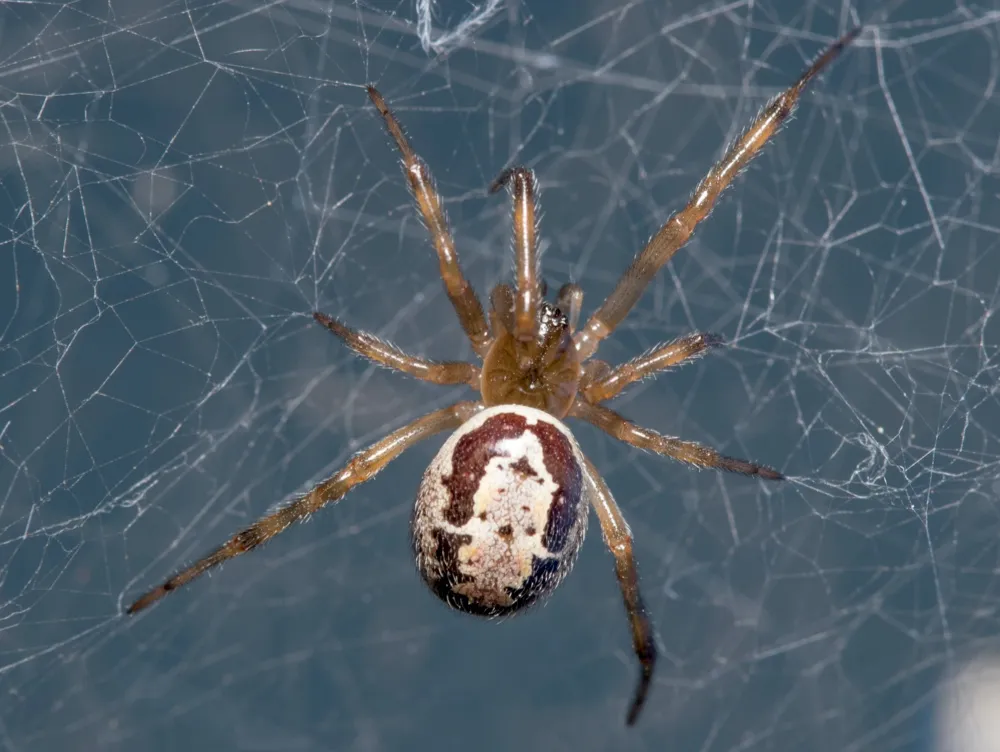You could be forgiven for thinking that the UK is in the grip of a spider emergency. With “spider numbers surging” and “dangerous bite warnings” being issued in the media, people are being “terrorised” and even hospitalised.
These headlines have been building for a few years, and the species behind the media arachnid obsession is the noble false widow spider Steatoda nobilis.
A relative newcomer to the UK, the species originates from the Canary Islands and Madeira. First reported from a site near Torquay in 1879, it spread through southern England, building up from the 1980s to become quite abundant, particularly in urban areas.
It has also been expanding its range northwards over time. So, although the lurid headlines are recent, the species has been around in many parts of the country for some time.
Read more about spiders:
- Spider silk used to create lenses for imaging human tissue
- Spider silk could be used to make robotic muscles
- Spider found nursing its offspring with milk
If we want to get to the truth behind the headlines then there are several questions we need to answer. First, can noble false widows actually bite? There are not many UK species of spiders with fangs that are able to pierce our skin, but the noble false widow’s fangs certainly can.
However, in common with most spiders, they are not aggressive. Bites seem to occur when spiders are trapped in clothing or when people are asleep and perhaps roll over, trapping a spider. It is little comfort for anyone that has been bitten, but it is important to keep in mind that these animals are not out to get us.
The second question we need to answer is, are bites getting more frequent? Given that the spiders are getting more abundant, and that they are found where people live, then this certainly seems likely.
It is also supported by evidence away from the headlines. The noble false widow has been increasing in Ireland, and a study was recently conducted at the National University of Ireland, Galway on their bites.
Aiste Vitkauskaite, an Msc student in Toxicology and joint lead in the study, reported: “Approximately 10 species of Irish spiders have fangs large enough to bite through human skin, yet over the past five years, we have never heard of anybody being bitten by any of the native species. Within the same period, we have recorded dozens of confirmed or probable false widow bites.”
Vitkauskaite went on to confirm that: “These spiders will become increasingly common and so will their bites.”

The final, and perhaps most important question to answer is, are the bites medically significant? This is a challenging question to answer. It can be difficult to confirm that a bite has been caused by a spider at all, and if it has, which species was the culprit. The Ireland study bypassed species misidentification (and noble false widow spiders are easily confused with similar species) by using DNA extraction and genetic profiling.
This allowed them to confirm 'envenomation', when spider bites result in venom being injected, in 16 cases. Symptoms included debilitating pain, tremors, fatigue, nausea and low blood pressure. Bites were also able to cause bacterial infections, including cellulitis and dermatitis.
Whilst many bites likely result in only mild symptoms, in some people bites can cause more severe reactions and, the study found, hospitalisation was required in some cases. The study warns that noble false widows may represent a potential threat to public health.
Although this new study shows that in some cases noble false widow bites can cause problems, we need to keep things in perspective. No one has died as a consequence of spider venom in the UK, whereas around five people a year are killed by wasp and bee stings, and several people die annually from dog attacks. Spider bites seem to tap into our deepest fears, but remember that many of us have lived with, and will continue to live with, noble false widow spiders around our homes with no ill effects.
Read more fromReality Check:
- COVID booster shots: How do they work ,and when will we need them?
- Microplastics: Are they harming me, and can I do anything about it?
- BMI: We know it's flawed, so why do we use it?
Indeed, I doubt most people are even aware of them. I have been sent many photographs of spiders thought to be noble false widows and very few have been. As with all risks, we should keep things in perspective and perhaps be grateful that the UK has very few animals that can do us any harm at all.
If you are unlucky enough to get bitten by a false widow spider, then don’t panic. Try to get a photograph of the spider, or, if you can do so safely, capture it for later identification. Like a bee sting, there may be some pain and swelling but if you develop other symptoms, or the pain becomes more severe, then you should seek medical attention.
- Visit the BBC’sReality Checkwebsite atbit.ly/reality_check_
About our expert, Prof Adam Hart
Adam is an entomologist and the University of Gloucestershire’s Professor of Science Communication. As well as research and teaching, he is a regular broadcaster for BBC Radio 4 and the BBC World Service, and has also co-presented several television documentary series for BBC2 and BBC4. His latest book, Unfit for Purpose (£16.99, Bloomsbury Sigma) is out now.
